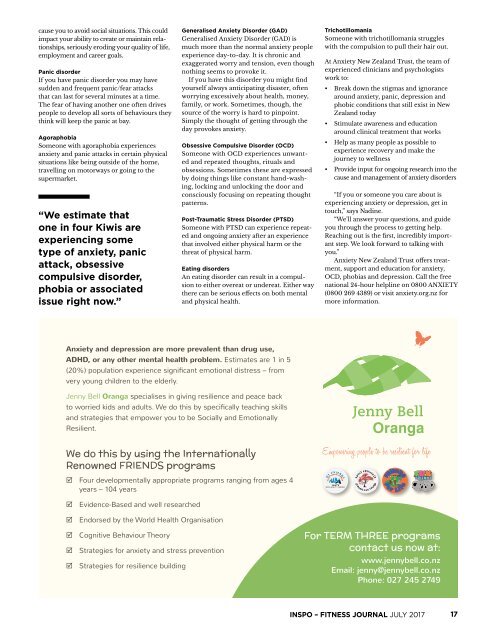INSPO Fitness Journal July 2017
Everything from nutrition, beauty, home and workplace wellbeing to health, performance – and so much more.
Everything from nutrition, beauty, home and workplace wellbeing to health, performance – and so much more.
You also want an ePaper? Increase the reach of your titles
YUMPU automatically turns print PDFs into web optimized ePapers that Google loves.
cause you to avoid social situations. This could<br />
impact your ability to create or maintain relationships,<br />
seriously eroding your quality of life,<br />
employment and career goals.<br />
Panic disorder<br />
If you have panic disorder you may have<br />
sudden and frequent panic/fear attacks<br />
that can last for several minutes at a time.<br />
The fear of having another one often drives<br />
people to develop all sorts of behaviours they<br />
think will keep the panic at bay.<br />
Agoraphobia<br />
Someone with agoraphobia experiences<br />
anxiety and panic attacks in certain physical<br />
situations like being outside of the home,<br />
travelling on motorways or going to the<br />
supermarket.<br />
“We estimate that<br />
one in four Kiwis are<br />
experiencing some<br />
type of anxiety, panic<br />
attack, obsessive<br />
compulsive disorder,<br />
phobia or associated<br />
issue right now.”<br />
Generalised Anxiety Disorder (GAD)<br />
Generalised Anxiety Disorder (GAD) is<br />
much more than the normal anxiety people<br />
experience day-to-day. It is chronic and<br />
exaggerated worry and tension, even though<br />
nothing seems to provoke it.<br />
If you have this disorder you might find<br />
yourself always anticipating disaster, often<br />
worrying excessively about health, money,<br />
family, or work. Sometimes, though, the<br />
source of the worry is hard to pinpoint.<br />
Simply the thought of getting through the<br />
day provokes anxiety.<br />
Obsessive Compulsive Disorder (OCD)<br />
Someone with OCD experiences unwanted<br />
and repeated thoughts, rituals and<br />
obsessions. Sometimes these are expressed<br />
by doing things like constant hand-washing,<br />
locking and unlocking the door and<br />
consciously focusing on repeating thought<br />
patterns.<br />
Post-Traumatic Stress Disorder (PTSD)<br />
Someone with PTSD can experience repeated<br />
and ongoing anxiety after an experience<br />
that involved either physical harm or the<br />
threat of physical harm.<br />
Eating disorders<br />
An eating disorder can result in a compulsion<br />
to either overeat or undereat. Either way<br />
there can be serious effects on both mental<br />
and physical health.<br />
Trichotillomania<br />
Someone with trichotillomania struggles<br />
with the compulsion to pull their hair out.<br />
At Anxiety New Zealand Trust, the team of<br />
experienced clinicians and psychologists<br />
work to:<br />
• Break down the stigmas and ignorance<br />
around anxiety, panic, depression and<br />
phobic conditions that still exist in New<br />
Zealand today<br />
• Stimulate awareness and education<br />
around clinical treatment that works<br />
• Help as many people as possible to<br />
experience recovery and make the<br />
journey to wellness<br />
• Provide input for ongoing research into the<br />
cause and management of anxiety disorders<br />
“If you or someone you care about is<br />
experiencing anxiety or depression, get in<br />
touch,” says Nadine.<br />
“We’ll answer your questions, and guide<br />
you through the process to getting help.<br />
Reaching out is the first, incredibly important<br />
step. We look forward to talking with<br />
you.”<br />
Anxiety New Zealand Trust offers treatment,<br />
support and education for anxiety,<br />
OCD, phobias and depression. Call the free<br />
national 24-hour helpline on 0800 ANXIETY<br />
(0800 269 4389) or visit anxiety.org.nz for<br />
more information.<br />
Anxiety and depression are more prevalent than drug use,<br />
ADHD, or any other mental health problem. Estimates are 1 in 5<br />
(20%) population experience significant emotional distress – from<br />
very young children to the elderly.<br />
Jenny Bell Oranga specialises in giving resilience and peace back<br />
to worried kids and adults. We do this by specifically teaching skills<br />
and strategies that empower you to be Socially and Emotionally<br />
Resilient.<br />
We do this by using the Internationally<br />
Renowned FRIENDS programs<br />
þ Four developmentally appropriate programs ranging from ages 4<br />
years – 104 years<br />
þ Evidence-Based and well researched<br />
þ Endorsed by the World Health Organisation<br />
þ Cognitive Behaviour Theory<br />
þ Strategies for anxiety and stress prevention<br />
þ Strategies for resilience building<br />
For TERM THREE programs<br />
contact us now at:<br />
www.jennybell.co.nz<br />
Email: jenny@jennybell.co.nz<br />
Phone: 027 245 2749<br />
<strong>INSPO</strong> – FITNESS JOURNAL JULY <strong>2017</strong><br />
17


















